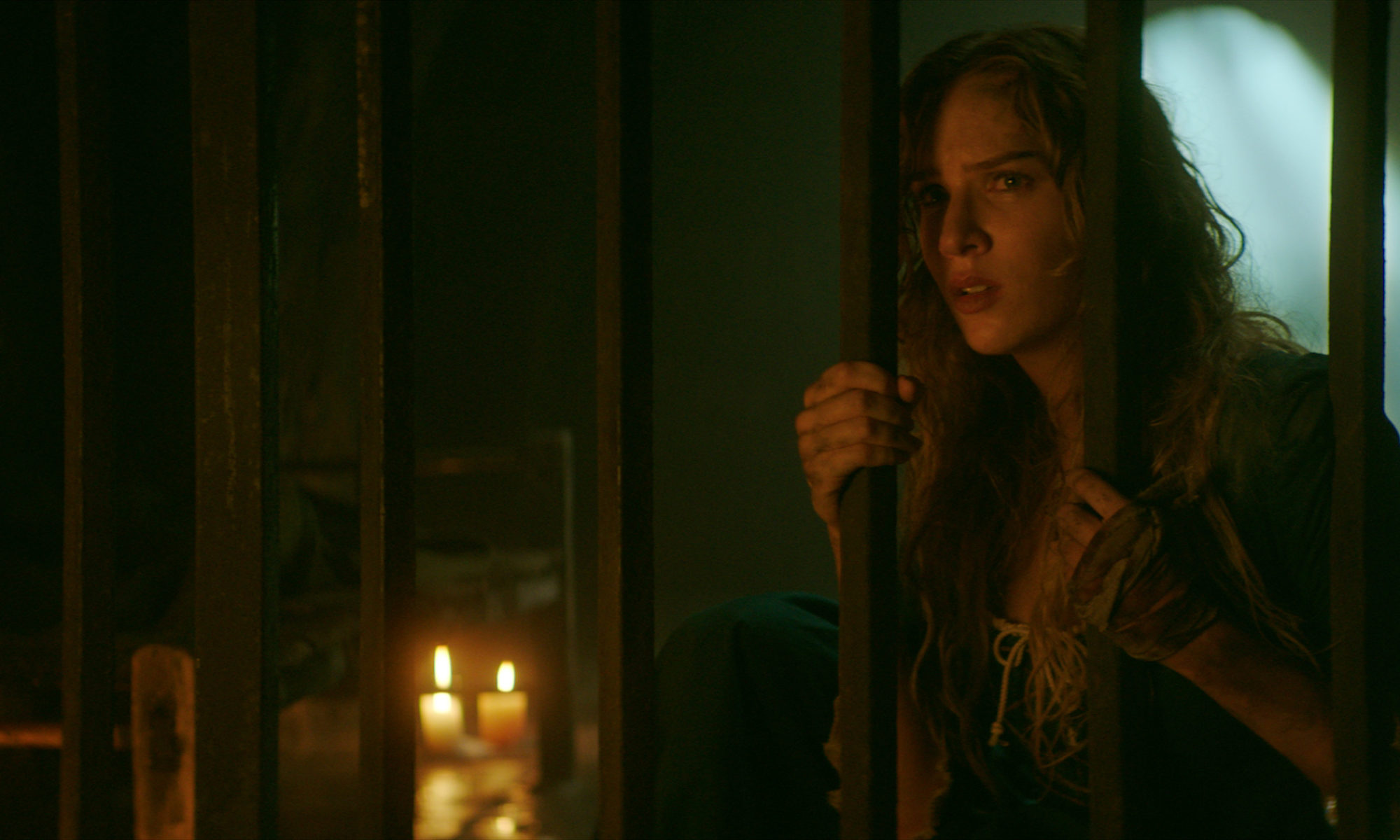Imagine a downbeat cross between historical romance, rape-revenge thriller and what’s become known as folk horror and you’ll have a pretty good idea of the overall mood of The Reckoning. Writer-director Neil Marshall, who made a splash as a genre director back in the early 2000s with Dog Soldiers (werewolves vs army men) and Sundance smash The Descent (CHUDs vs spelunkers), casts co-writer Charlotte Kirk as Grace Haverstock, a woman unjustly accused of witchcraft after the death of her husband during the English plague epidemic of 1665. After Grace rebuffs the advances of local squire, landlord and sex pest Pendleton (Steven Waddington), he helps convince the townspeople that she must be a witch, summoning Judge Moorcroft (Sean Pertwee, trying his best to crawl out from under Vincent Price’s indelible Witchfinder General performance) to elicit her confession of heresy.
Continue readingEvilspeak
48/100Consider the pig. Pork is damned near a gourmet food these days. Celebrity chefs will serve you layers of pork belly wrapped around potatoes, figs, even pineapple. They’ll dip bacon in chocolate, infuse it in vodka, or drape it across an ice-cream sundae, resplendent in its brown glory. Your local organic market probably sells artisanal bacon cured with dark, fine-grained muscovado imported from Mauritius and flavored with angel farts and faerie dust. The recent cinema has also celebrated the pig, via two excellent Babe movies and a decent adaptation of Charlotte’s Web. It wasn’t always that way, though. No less an authority than God Himself went Old Testament on pork back in the day, and it took the famous and completely disingenuous “Pork: The Other White Meat” campaign to rehabilitate swine for the U.S. market. What I mean to say is that the 1982 horror movie Evilspeak, in which a trio of crazed, Satan-possessed porkers burst into a bathroom and disembowel a nude woman taking a shower, couldn’t have done the humble pig’s reputation any favours. Continue reading
House of the Devil
58/100Antichrist

Lars Von Trier has been ducking accusations that he holds the female sex in a rather low regard for as long as he’s been making movies about suffering women. Breaking the Waves set the stage for the next decade or more of his career in grand fashion, with an epic chronicle of female sacrifice that climaxed with the conflation of a woman’s faith and debasement receiving the approval of a watchful God. Arguing on Usenet back in the day, I briefly advanced a crackpot theory that Breaking the Waves was a kind of metaphysical horror movie, an audience’s revulsion at the sexual hoops Bess jumps through in the belief that her promiscuity will somehow help heal her husband’s paralyzing injury meant to be surpassed only by its astonishment that the universe was run by an entity that considered such behavior not only noble but exemplary. For the hell of it, I sent a quick email to an address that I believed to be Von Trier’s, asking, “Does Breaking the Waves have a happy ending?” The one-word response came back overnight: “Yes!!!!” So much for irony.
Angélique and the King
 Angélique (Michèle Mercier) roars back to life in this lively third installment in the five-film series, which sees her becoming a crucial instrument in the affairs of Louis XIV, and thus the subject of much palace intrigue. When Angelique accepts a diplomatic assignment to the Persian ambassador Bachtiary-Bey (Sami Frey), she’s rewarded with Peyrac’s estate — now she has two manors — but ends up as a kind of political prisoner, the captive of Bachtiary-Bey, who intends to rape and perhaps murder her. Rescued in the nick of time (by a Hungarian prince!), she returns to the king’s court, where she’s regarded with dismay by the king’s wife and actively scorned by the king’s current mistress, who senses impending obsolescence. The second half of the film is the most brashly inventive part of the series so far, including one recurring character’s death, another’s return from the grave, multiple attempts on Angélique’s life, and even a black mass.
Angélique (Michèle Mercier) roars back to life in this lively third installment in the five-film series, which sees her becoming a crucial instrument in the affairs of Louis XIV, and thus the subject of much palace intrigue. When Angelique accepts a diplomatic assignment to the Persian ambassador Bachtiary-Bey (Sami Frey), she’s rewarded with Peyrac’s estate — now she has two manors — but ends up as a kind of political prisoner, the captive of Bachtiary-Bey, who intends to rape and perhaps murder her. Rescued in the nick of time (by a Hungarian prince!), she returns to the king’s court, where she’s regarded with dismay by the king’s wife and actively scorned by the king’s current mistress, who senses impending obsolescence. The second half of the film is the most brashly inventive part of the series so far, including one recurring character’s death, another’s return from the grave, multiple attempts on Angélique’s life, and even a black mass.
Rosemary’s Baby
95/100The Blood on Satan’s Claw
69/100
The Blood on Satan’s Claw, a 1971 horror melodrama from English genre studio Tigon, lacks the moral underpinnings of Michael Reeves’ cautionary classic Witchfinder General but resembles it in setting and atmosphere. Where Witchfinder General was all about the villainous official played by Vincent Price who saw witchcraft in every corner – or, cynically, used accusations of witchery to advance his own personal and political aspirations – The Blood on Satan’s Claw clarifies the relationship between wickedness and virtue by showing how evil, in the guise of rebellious children and especially a seductive teenager, can be vanquished by vigilance and bravery on the part of Christian men. It’s the kind of movie where the cranky old judge who ducks out of town at the first signs of a supernatural dust-up returns in the final reel, empowered to vanquish the devil himself.
Continue reading



